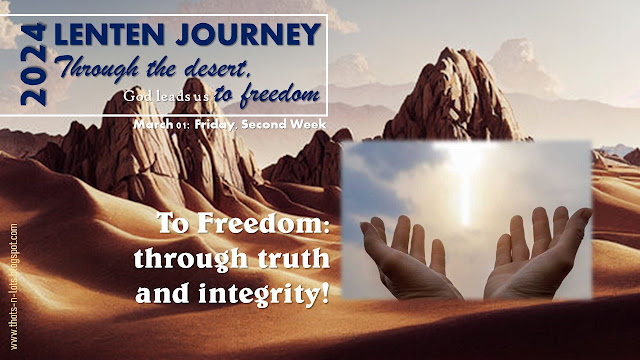To grow up to glory!
THE WORD IN LENT - SECOND SUNDAY
Genesis 22:1-2,9-13,15-18; Romans 8:31-34; Mark 9:2-10
The journey that was given as a task for us last week was from the desert to the waters, from the waters of the flood to the waters of baptism, the waters of the covenant. In this second week of lent we are challenged to journey from the waters to the mountain. What does it mean? What does this journey comprise, the journey from the waters to the mountain?
The waters of baptism is a gift; it is a grace given to us. But living faithful to it, remaining with the enthusiasm and spirit of the initial fervour is not an automatic outcome... it is an uphill task. That is what the Word literally presents today: Abraham uphill, Jesus up the hill, and both of them returning more strengthened than before, both of them coming down affirmed of their union in the Lord, to face the rest of the turmoil of life - that is our next piece of Lenten journey. From the waters to the mountains, from what we have received to what we are ready to make of it; from what has been given to what wish to grow out of it.
Mountain - a call to climb
First of all the symbol of the mountain today stands for the call we have, to climb, to rise, to grow, to become stronger, to go to the next level. Faith is a given; we need to grow in it. Abraham was already called and he had accepted to walk in the light of the Lord. But that was not enough, he had to graduate, and move on to the next level.
Francis de Sales speaking of our call to love God and our experience of the loving God, explains at a moment about how we need to progress in it - from the love of a weak and fragile child to the love of someone ready to give up anything for the love of God. St Paul offers us the image of a child who is fed liquid food and grown ups who need solid food. Our faith cannot remain the same as when we received it; it has to constantly grow. When it stops its progress, it begins to deteriorate. That is where the image of the mountain is so accurate, if you stop climbing, you begin to slide down. Our spiritual life is a up hill journey, and we need to readily take it up.
Mountain - a call to sacrifice
Going up the mountain, as a task in itself, is tough. Its implications make it tougher yet. Decision to go up the mountain reminds us of the sacrifice involved - let us think of Abraham today who was going up to sacrifice his son; let us think of Jesus who had his imminent suffering very clear in his mind. Be it Abraham or Jesus or any person of God for that matter, when there is a call that sets them on a specific journey, they were mindful of the sacrifice that was expected of them.
At times we think that God's blessings consist in the fact that there are no sufferings, no hardships, no troubles or no trials. That is never a fact, from a Christian point of view. God's blessing in fact consists in finding meaning in that suffering, finding purpose in the sacrifice, finding a profound element of growth in our temptations and trials. The call to come to the mountain, involves in scaling this height of looking at and accepting the trials of our lives from the perspective of God. It was not possible for the Apostles. and Jesus had to tell them to wait till they understood everything from the perspective of God, until Jesus would die and rise from the dead. Experiencing resurrecftion would mean readiness to go through death; becoming the father of the entire generations of faith would mean being ready to give up his only son. Mountain, therefore is not something we fear or resent, but something that I am willing and ready to confront, not because I am capable and strong, but because God is for me, and I dont mind who is against me!
Mountain - a call to glory
Mountains signify the glory of God. The heights, the splendour, the light, the nature, the life giving freshness... all these are symbolic of God's presence. When we go up the mountain, we feel closer to the Almighty. Mountain experience is always explained as the experience of an intimate closeness to God, in contrast to the desert experience. It is wonderful to be there! But what matters is not being there where we find wonderful, but believing that where God is, it is wonderful to be there. Glory is where God is. When we are with God, we are in glory. We cannot fix our glory elsewhere and ask God to be there! That is why it becomes important to listen to the Lord, to know what the Lord wants of us, to know where God wants us to be! There we shall find the glory.
We are called to glory. It comes from an arduous journey up hill. It is born of a readiness to give up anything for God's sake. We are called to grow in that mind set, the mind set of true faith, mature faith that can confidently say, when God is for us, no one can be against us. Hence this lenten journey we have undertaken is a journey towards that glory, that comes from fixing our eyes on the Lord and going up to the Lord; let us heed to the call to grow up to glory!




























